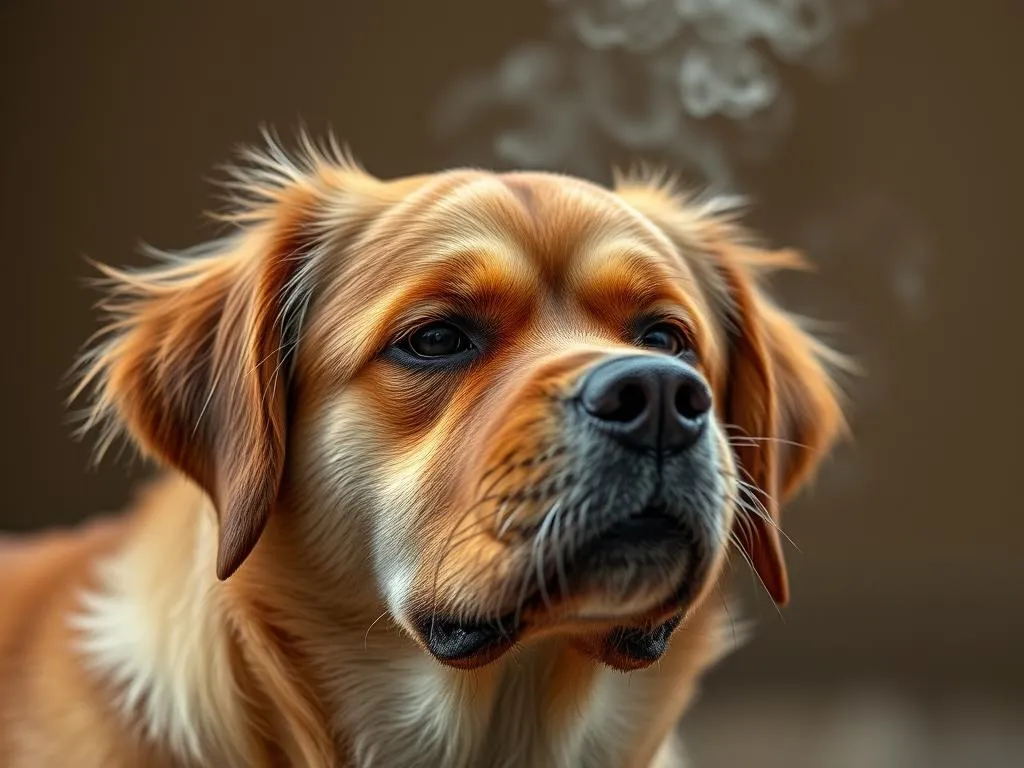
We’ve all been there. You’re sitting on the couch, enjoying a quiet evening, when suddenly, a foul odor fills the air. You look over at your dog, who seems completely oblivious to the chaos they’ve just unleashed. Why do my dog’s farts smell so bad? This common concern among pet owners often leads to embarrassment, confusion, and even worry about their furry friend’s health.
Understanding the reasons behind your dog’s stinky gas is crucial for maintaining their overall health and well-being. From dietary choices to digestive issues, various factors can contribute to this smelly phenomenon. In this article, we will delve into the intricacies of canine digestion, explore the various causes of smelly farts, and discuss prevention and management strategies you can implement to keep your pup comfortable—and your home a little less odorous.
Understanding Dog Digestion
The Canine Digestive System
To grasp why your dog may be producing such unbearable gas, it’s essential to understand how their digestive system works. Dogs have a monogastric digestive system, similar to humans but with key differences. Their digestive tract consists of the mouth, esophagus, stomach, small intestine, and large intestine.
When dogs eat, their food travels down the esophagus to the stomach, where it is mixed with gastric juices and broken down. From there, it moves into the small intestine, where nutrients are absorbed. The remaining waste is then passed into the large intestine, where water is absorbed, and the remaining material is prepared for elimination.
Dogs are not equipped to digest certain foods as efficiently as humans, which can lead to gas production. The fermentation of undigested food in the intestines often results in smelly gas, especially if the food contains ingredients that are difficult for dogs to break down.
Common Digestive Issues in Dogs
Gas production is a normal aspect of digestion, but excessive gassiness can indicate underlying health issues. Some common causes of increased gas in dogs include:
- Dietary indiscretion: Dogs are notorious for scavenging or eating things they shouldn’t, leading to upset stomachs and gas.
- Gastrointestinal issues: Conditions such as inflammatory bowel disease or food intolerances can cause excessive gas.
- Swallowing air: Dogs that eat too quickly can swallow air, contributing to gas buildup.
Understanding these digestive dynamics is the first step in addressing the question, why do my dog’s farts smell so bad?
Causes of Smelly Dog Farts
Diet-Related Causes
One of the most significant contributors to smelly dog farts is diet. The type of food you feed your dog can dramatically impact their digestive health. Here are some dietary elements that can lead to increased gas production:
- High-fiber foods: While fiber is essential for digestion, certain high-fiber foods, like beans and broccoli, can cause gas when fermented in the intestines.
- Dairy products: Many dogs are lactose intolerant, leading to bloating and gas when they consume dairy.
- Food additives and fillers: Some commercial dog foods contain fillers and artificial additives that can be hard for dogs to digest, contributing to gas.
If you notice your dog’s farts becoming increasingly foul after dietary changes, it may be time to evaluate their food.
Health-Related Causes
In addition to dietary factors, various health issues can also lead to smelly farts:
- Parasites: Intestinal parasites like worms can cause gastrointestinal upset, resulting in gas.
- Infections: Bacterial infections in the gut can disrupt normal digestion and lead to excessive gas.
- Sensitivities and allergies: Dogs can develop sensitivities to specific ingredients, such as gluten or certain proteins, leading to digestive disturbances and gas.
If dietary adjustments don’t yield results, it may be wise to consult a veterinarian to rule out health-related causes.
Behavioral Causes
Behavior also plays a role in the production of smelly gas. Dogs that eat too quickly can swallow air alongside their food, leading to gas buildup. This behavior can be exacerbated by stress or changes in routine, which can cause anxiety and rapid eating.
Identifying Smelly Farts in Dogs
Signs That Indicate a Problem
Not all dog farts are created equal. It’s essential to distinguish between normal gas and excessive farting that may signal a problem. Here are some criteria to help you identify when to take action:
- Frequency: While occasional gas is normal, excessive farting (multiple times a day) can be a sign of an underlying issue.
- Odor: If your dog’s farts are consistently foul-smelling, this could indicate a dietary or digestive problem.
- Accompanying symptoms: Keep an eye out for additional symptoms such as diarrhea, vomiting, or lethargy, which may indicate a more serious health concern.
When to Consult a Veterinarian
If you notice excessive farting along with other concerning symptoms, it’s time to consult a veterinarian. Here are some guidelines to help you decide when to seek professional help:
- Duration: If your dog has been gassy for more than a few days without improvement.
- Behavior Changes: If your dog shows signs of discomfort, lethargy, or changes in appetite.
- Dietary Changes: If you’ve recently introduced new foods and your dog is experiencing gas and other digestive issues.
Keeping a record of your dog’s symptoms and diet can be invaluable for your veterinarian in diagnosing potential issues.
Prevention and Management
Dietary Adjustments
One of the most effective ways to manage your dog’s gas is through dietary changes. Here are some recommendations:
- High-quality dog food: Opt for a dog food with high-quality proteins and minimal fillers and additives.
- Gradual changes: When switching foods, do so gradually over a week or two to avoid upsetting your dog’s stomach.
- Limit gas-inducing foods: Avoid feeding your dog beans, dairy, and other known gas-producing foods.
Behavioral Changes
If your dog tends to eat too quickly, consider these strategies to slow down their eating:
- Puzzle feeders: These interactive feeders make your dog work for their food, slowing down their eating pace.
- Smaller, more frequent meals: Feeding smaller portions throughout the day can reduce gas production by lessening the load on their digestive system.
Additionally, stress management can help reduce rapid eating. Establish a calm feeding environment, and consider providing a safe space for your dog to eat without distractions.
Regular Vet Check-ups
Routine veterinary check-ups are crucial for maintaining your dog’s health and can help catch problems early. Regular fecal examinations can help identify parasite infestations, and your vet can provide tailored dietary advice based on your dog’s health and age.
Home Remedies and Treatments
Natural Remedies
If you’re looking for natural solutions to reduce your dog’s gas, consider the following remedies:
- Probiotics: Adding probiotics to your dog’s diet can help balance gut bacteria and improve digestion.
- Pumpkin: Plain canned pumpkin (not the spiced pie filling) is high in fiber and can help regulate digestion.
Always consult your veterinarian before introducing new remedies to ensure they are safe for your dog.
Over-the-Counter Treatments
There are also over-the-counter products available that may help manage your dog’s gas:
- Digestive enzymes: These can assist in breaking down food more effectively.
- Gas relief products: Look for products specifically designed for dogs, but always check with your vet for recommendations and safety considerations.
Conclusion
Understanding why do my dog’s farts smell so bad is essential for every pet owner. It can help you make informed decisions about your dog’s diet, recognize signs of potential health issues, and implement effective prevention and management strategies. By paying attention to your dog’s health and making necessary adjustments, you can help keep their digestive system running smoothly and your home smelling fresh.
Being proactive in your dog’s health care not only leads to a happier, healthier pet but can also prevent embarrassing moments caused by unchecked gas. If you’re concerned about your dog’s digestive health, don’t hesitate to reach out to your veterinarian for guidance and support. Your furry friend deserves the best care possible!









